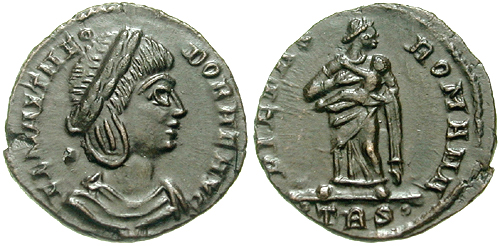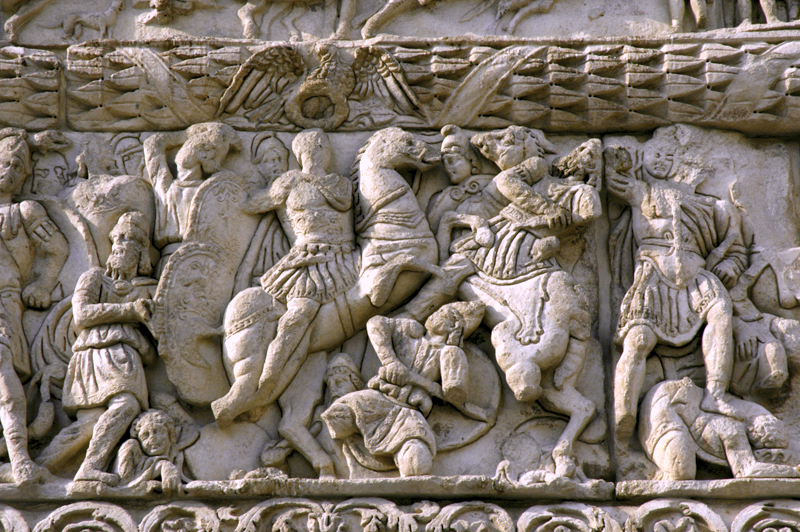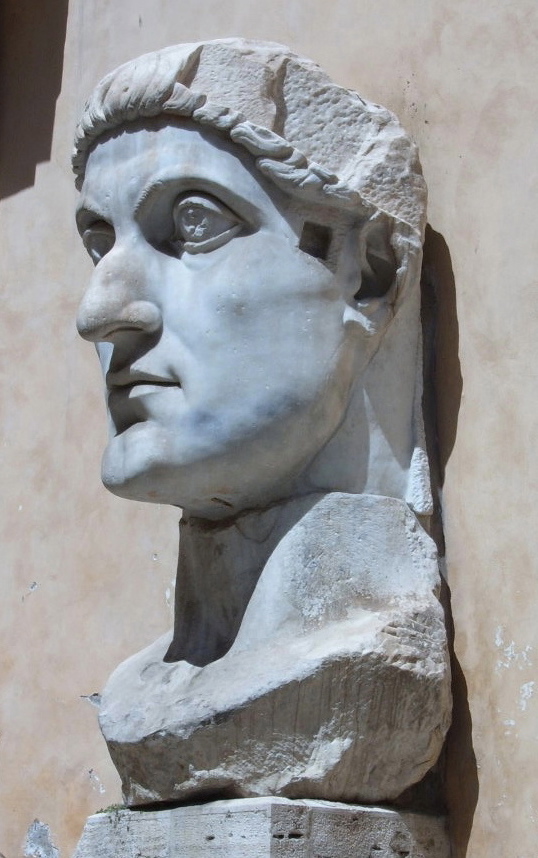|
306
__NOTOC__ Year 306 ( CCCVI) was a common year starting on Tuesday of the Julian calendar. At the time, it was known as the Year of the Consulship of Constantius and Valerius (or, less frequently, year 1059 ''Ab urbe condita''). The denomination 306 for this year has been used since the early medieval period, when the Anno Domini calendar era became the prevalent method in Europe for naming years. Events By place Roman Empire * July 25 – Constantius I dies outside Eboracum (modern-day York). Constantine, aged 23 or 24, is declared emperor by his troops. Emperor Galerius grants Constantine the title of Caesar, and elevates Flavius Valerius Severus to emperor in the Western part of the Roman Empire.''Consularia Constantinopolitana'' 306, in ''Monumenta Germaniae Historica'' ant. 11: '' Chronica Minora'' Vol. 1 (Theodor Mommsen ed., 1892) p. 231. * Constantine institutes toleration of the Christians in his territories. * Constantine establishes his capital in August ... [...More Info...] [...Related Items...] OR: [Wikipedia] [Google] [Baidu] |
Constantius I
Flavius Valerius Constantius ( – 25 July 306), also called Constantius I, was a Roman emperor from 305 to 306. He was one of the four original members of the Tetrarchy established by Diocletian, first serving as ''caesar'' from 293 to 305 and then ruling as ''augustus'' until his death. Constantius was also father of Constantine the Great, the first Christian emperor of Rome. The nickname "Chlorus" () was first popularized by Byzantine-era historians and not used during the emperor's lifetime. As an Illyrian soldier of humble origin, Constantius had a distinguished military career and rose to the top ranks of the army. Around 289, he set aside Helena, Constantine's mother, to marry a daughter of Emperor Maximian, and in 293 was added to the imperial college by Maximian's colleague Diocletian. Assigned to rule Gaul, Constantius defeated the usurper Carausius there and his successor Allectus in Britain, and campaigned extensively along the Rhine frontier, defeating th ... [...More Info...] [...Related Items...] OR: [Wikipedia] [Google] [Baidu] |
Maxentius
Marcus Aurelius Valerius Maxentius ( 283 – 28 October 312) was a Roman emperor from 306 until his death in 312. Despite ruling in Italy and North Africa, and having the recognition of the Senate in Rome, he was not recognized as a legitimate emperor by his fellow emperors. He was the son of former Emperor Maximian and the son-in-law of Emperor Galerius. The latter part of his reign was preoccupied with civil war, allying with Maximinus against Licinius and Constantine. The latter defeated him at the Battle of the Milvian Bridge in 312, where Maxentius, with his army in flight, purportedly perished by drowning in the Tiber river. Maxentius was the last emperor permanently to reside in Rome. He attempted to embellish, restore and improve the ancient capital, carrying out important building works, including the Temple of the Divine Romulus (dedicated to his deceased son), the Basilica of Maxentius, which was completed by Constantine, the villa and the circus of Maxentius. ... [...More Info...] [...Related Items...] OR: [Wikipedia] [Google] [Baidu] |
Flavius Valerius Severus
Flavius Valerius Severus (died September 307), enumerated as Severus II, was a Roman emperor from 306 to 307, and a member of the Tetrarchy. He shared control of the western half of the empire with Constantine I, but spent most of his short reign in a civil war against the usurper Maxentius, who later killed him and took over Italy. Background and early career Severus was of humble birth, born in Northern Illyria around the middle of the third century.Aurelius Victor (4th century), '' Liber de Caesaribus'' A friend of emperor Galerius, he rose to become a senior officer in the Roman army, being nominated as ''caesar'' of the Western Roman Empire. According to Lactantius, Diocletian objected to Galerius's suggestion, saying in response, "What! That dancer, that habitual drunkard who turns night into day and day into night?" Galerius persisted, saying that Severus had served faithfully as paymaster and purveyor of the army.Lactantius (4th century). Lord Hailes (transl.) (2021) ... [...More Info...] [...Related Items...] OR: [Wikipedia] [Google] [Baidu] |
Galerius
Galerius Valerius Maximianus (; Greek: Γαλέριος; 258 – May 311) was Roman emperor from 305 to 311. He participated in the system of government later known as the Tetrarchy, first acting as '' caesar'' under Emperor Diocletian. In this period Galerius obtained victory warring against the Persian Sassanian Empire, defeating Narseh at the battle of Satala in 298 and possibly sacking the Sassanian capital of Ctesiphon in 299. He also campaigned across the Danube against the Carpi, defeating them in 297 and 300. Galerius was promoted to ''augustus'' upon the abdication of Diocletian in 305, but had to contend with multiple usurpers as the Tetrarchic system broke down. Although he was a staunch opponent of Christianity, he ended the Diocletianic Persecution by issuing the Edict of Serdica in 311. Early life Galerius was born in the Danube provinces, either near Serdica or at the place where he later built his palace named after his mother – Felix Romuliana ( Gamzigr ... [...More Info...] [...Related Items...] OR: [Wikipedia] [Google] [Baidu] |
York
York is a cathedral city in North Yorkshire, England, with Roman Britain, Roman origins, sited at the confluence of the rivers River Ouse, Yorkshire, Ouse and River Foss, Foss. It has many historic buildings and other structures, such as a York Minster, minster, York Castle, castle and York city walls, city walls, all of which are Listed building, Grade I listed. It is the largest settlement and the administrative centre of the wider City of York district. It is located north-east of Leeds, south of Newcastle upon Tyne and north of London. York's built-up area had a recorded population of 141,685 at the 2021 United Kingdom census, 2021 census. The city was founded under the name of Eboracum in AD 71. It then became the capital of Britannia Inferior, a province of the Roman Empire, and was later the capital of the kingdoms of Deira, Northumbria and Jórvík, Scandinavian York. In the England in the Middle Ages, Middle Ages it became the Province of York, northern England ... [...More Info...] [...Related Items...] OR: [Wikipedia] [Google] [Baidu] |
Maximian
Maximian (; ), nicknamed Herculius, was Roman emperor from 286 to 305. He was ''Caesar (title), Caesar'' from 285 to 286, then ''Augustus (title), Augustus'' from 286 to 305. He shared the latter title with his co-emperor and superior, Diocletian, whose political brain complemented Maximian's military brawn. Maximian established his residence at Trier but spent most of his time on campaign. In late 285, he suppressed rebels in Gaul known as the Bagaudae. From 285 to 288, he fought against Germanic tribes along the Rhine frontier. Together with Diocletian, he launched a scorched earth campaign deep into Alamannic territory in 288, refortifying the frontier. The man he appointed to police the English Channel, Channel shores, Carausius, rebelled in 286, causing the secession of Britain and northwestern Gaul. Maximian failed to oust Carausius, and his invasion fleet was destroyed by storms in 289 or 290. Maximian's subordinate Constantius Chlorus, Constantius campaigned against Cara ... [...More Info...] [...Related Items...] OR: [Wikipedia] [Google] [Baidu] |
Caesar (title)
Caesar ( English language, English Caesars; Latin ; in Greek: ) is a title of imperial character. It derives from the ''cognomen'' of Julius Caesar. The change from being a surname to a title used by the Roman emperors can be traced to AD 68, following the fall of the Julio-Claudian dynasty. When used on its own, the title denoted heirs apparent, who would later adopt the title ''Augustus (title), Augustus'' on accession. The title remained an essential part of the style of the emperors, and became the word for "emperor" in some languages, such as German () and Slavic (). Origins The first known individual to bear the ''cognomen'' of "Caesar" was Sextus Julius Caesar (praetor 208 BC), Sextus Julius Caesar, who is likewise believed to be the common ancestor of all subsequent Julii Caesares. Sextus's great-grandson was the dictator Julius Caesar, Gaius Julius Caesar, who seized control of the Roman Republic following his Caesar's civil war, war against the Roman Senate ... [...More Info...] [...Related Items...] OR: [Wikipedia] [Google] [Baidu] |
Ancient Rome
In modern historiography, ancient Rome is the Roman people, Roman civilisation from the founding of Rome, founding of the Italian city of Rome in the 8th century BC to the Fall of the Western Roman Empire, collapse of the Western Roman Empire in the 5th century AD. It encompasses the Roman Kingdom (753–509 BC), the Roman Republic (50927 BC), and the Roman Empire (27 BC476 AD) until the fall of the western empire. Ancient Rome began as an Italic peoples, Italic settlement, traditionally dated to 753 BC, beside the River Tiber in the Italian peninsula. The settlement grew into the city and polity of Rome, and came to control its neighbours through a combination of treaties and military strength. It eventually controlled the Italian Peninsula, assimilating the Greece, Greek culture of southern Italy (Magna Graecia) and the Etruscans, Etruscan culture, and then became the dominant power in the Mediterranean region and parts of Europe. At its hei ... [...More Info...] [...Related Items...] OR: [Wikipedia] [Google] [Baidu] |
July 25
Events Pre-1600 * 306 – Constantine I is proclaimed Roman emperor by his troops. * 315 – The Arch of Constantine is completed near the Colosseum in Rome to commemorate Constantine I's victory over Maxentius at the Milvian Bridge. * 677 – Climax of the Siege of Thessalonica by the Slavs in a three-day assault on the city walls. * 864 – The Edict of Pistres of Charles the Bald orders defensive measures against the Vikings. * 918 – Wang Geon becomes King of Goryeo after overthrowing Gung Ye in a coup the previous day * 1137 – Eleanor of Aquitaine marries Prince Louis, later King Louis VII of France, at the Cathedral of Saint-André in Bordeaux. * 1139 – Battle of Ourique: The Almoravids, led by Ali ibn Yusuf, are defeated by Prince Afonso Henriques who is proclaimed King of Portugal. * 1261 – The city of Constantinople is recaptured by Nicaean forces under the command of Alexios Strategopoulos, re-establishing the By ... [...More Info...] [...Related Items...] OR: [Wikipedia] [Google] [Baidu] |
History Of Trier
Trier in Rhineland-Palatinate, whose history dates to the Roman Empire, is the oldest city in Germany. Traditionally it was known in English language, English by its French language, French name of Treves. Prehistory The first traces of human settlement in the area of the city show evidence of Linear Pottery culture, linear pottery settlements dating from the early Neolithic period. Since the last Christianization, pre-Christian centuries, members of the Celtic tribe of the Treveri settled in the area of today's Trier. Roman Empire The Roman Republic, Romans under Julius Caesar first subdued the Treveri in 58 to 50 BC. No later than 16 BC, at the foot of the hill later christened the Petrisberg, upon which a military camp had been set up in 30 BC and abandoned again a few months later, the Romans founded the city of ("City of Augustus in the land of the Treveri"), which has a claim to being the oldest city in Germany. The honour of being named after the Emperor was only ... [...More Info...] [...Related Items...] OR: [Wikipedia] [Google] [Baidu] |
Eboracum
Eboracum () was a castra, fort and later a coloniae, city in the Roman province of Roman Britain, Britannia. In its prime it was the largest town in northern Britain and a provincial capital. The site remained occupied after the decline of the Western Roman Empire and ultimately developed into the present-day city of York, in North Yorkshire, England. Two Roman emperors died in Eboracum: Septimius Severus in 211 AD, and Constantius Chlorus in 306 AD. The first known recorded mention of Eboracum by name is dated , and is an address containing the settlement's name, ''Eburaci'', on a wooden stylus tablet from the Roman fortress of Vindolanda in what is now Northumberland. During the Roman period, the name was written both ''Eboracum'' and ''Eburacum'' (in nominative form). The name ''Eboracum'' comes from the Common Brittonic ''*Eburākon'', which means "Taxus baccata, yew tree place". The word for "yew" was ''*ebura'' in Proto-Celtic (cf. Old Irish ''ibar'' "yew-tree ... [...More Info...] [...Related Items...] OR: [Wikipedia] [Google] [Baidu] |
Trier
Trier ( , ; ), formerly and traditionally known in English as Trèves ( , ) and Triers (see also Names of Trier in different languages, names in other languages), is a city on the banks of the Moselle (river), Moselle in Germany. It lies in a valley between low vine-covered hills of red sandstone in the west of the state of Rhineland-Palatinate, near the border with Luxembourg and within the important Mosel (wine region), Moselle wine region. Founded by the Ancient Romans, Romans in the late 1st century BC as ''Augusta Treverorum'' ("The City of Augustus among the Treveri"), Trier is considered Germany's oldest city. It is also the oldest cathedral, seat of a bishop north of the Alps. Trier was one of the four capitals of the Roman Empire during the Tetrarchy period in the late 3rd and early 4th centuries. In the Middle Ages, the archbishop-elector of Trier was an important prince of the Church who controlled land from the French border to the Rhine. The archbishop-elector of Tr ... [...More Info...] [...Related Items...] OR: [Wikipedia] [Google] [Baidu] |










